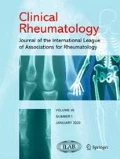Abstract
Patient self-management programs usually require participants to attend group sessions, which can be difficult for individuals with mobility issues. In addition, many programs are not disease specific. The purpose of this study was to evaluate the effects of a mail-delivered self-management program for individuals with scleroderma (SSc). The program consisted of a workbook and exercise DVD that provided information on medical aspects of the disease, dysphagia, fatigue management, advocacy, activities of daily living, oral hygiene, skin and wound care, psychosocial changes, exercises, and other features of the condition. Participants provided feedback on the effects of the self-management program by responding to questions on demographic and six self-report questionnaires, keeping a health log, and participating in a program evaluation interview. A total of 49 participants completed the program and returned the postintervention questionnaires. Participants consistently reported that the program was easy to use. Depression, fatigue, and pain decreased, and hand function, self-efficacy for controlling pain, and self-efficacy “other” improved; however, the only statistically significant change was in self-efficacy for pain. This is the first study to develop and assess the effects of a mail-delivered format for self-management for people with SSc. A self-management program should help individuals with SSc develop self-management strategies to manage this complex disease and advocate for themselves to promote better health.
Similar content being viewed by others
References
Lorig KR, Laurin J (1985) Some notions about assumptions underlying health education. Health Educ Q 12:231–243
Lorig KR, Ritter P, Stewart AL, Sobel DS, Brown BW Jr, Bandura A, Gonzalez VM, Laurent DD, Holman HR (2001) Chronic disease self-management program: 2-year health status and health care utilization outcomes. Med Care 39:1217–1223
Lorig KR, Tieer PL, Laurent DD, Plant K (2006) Internet-based chronic disease self-management program: a randomized trial. Med Care 44:964–71
Mendelson C (2003) Gentle hugs: Internet listservs as sources of support for women with lupus. ANS Adv Nurs Sci 26:299–306
Riemsma RP, Kirwan JR, Taal E, Rasker JJ (2002) Patient education for adults with rheumatoid arthritis. Cochrane Database Syst Rev (2):CD003688
Samuelson UK, Ahlmén EM (2000) Development and evaluation of a patient education program for persons with systemic sclerosis (scleroderma). Arthritis Care Res 13:141–148
Brown SJ, Somerset ME, Mccabe CS, Mchugh NJ (2004) The impact of group education on participants’ management of their disease in lupus and scleroderma. Musculoskeletal Care 2:207–217
Kwakkenbos L, Bluyssen SJ, Vonk MC, van Helmond AF, van den Ende CH, van den Hoogen FH, van Lankveld WG (2011) Addressing patient health care demands in systemic sclerosis: pre-post assessment of a psycho-educational group programme. Clin Exp Rheumatol 29:S60–S65
Mendelson C, Poole JL (2007) Become your own advocate: advice from women living with scleroderma. Disabil Rehabil 29:1492–1501
Lorig KR, Chastain RL, Ung E, Shoor S, Holman HR (1989) Development and evaluation of a scale to measure perceived self-efficacy in people with arthritis. Arthritis Rheum 32:37–44
Fries JF, Spitz PW, Kraine RG, Holman HR (1980) Measurement of patient outcome in arthritis. Arthritis & Rheum 23:137–145
Silman A, Akesson A, Newman J et al (1998) Assessment of functional ability in patients with scleroderma: a proposed new disability assessment instrument. J Rheumatol 25:79–83
Belza B (1995) Comparison of self-reported fatigue in rheumatoid arthritis and controls. J Rheumatol 22:639–643
Radloff LS (1977) The CES-D scale: a self-report depression scale for research in the general population. Appl Psychol Meas 1:385–401
Bassel M, Hudson M, Taillefer SS, Schieir O, Baron M, Thombs BD (2011) Frequency and impact of symptoms experienced by patients with systemic sclerosis: results from a Canadian National Survey. Rheumatology (Oxford) 50(4):762–767. doi:10.1093/rheumatology/keq310
Marks R, Allegrante JP, Lorig K (2005) A review and synthesis of research evidence for self-efficacy-enhancing interventions for reducing chronic disability: implications for health education practice (part II). Health Promot Pract 6(2):148–156
Lorig KR, Ritter PL, Laurent DD, Fries JF (2004) Long-term randomized controlled trials of tailor-print and small-group arthritis self-management interventions. Med Care 42:346–354
Fries JF, Carey C, McShane DJ (1997) Patient education in arthritis: randomized controlled trial of a mail-delivered program. J Rheumatol 24:1378–1383
Singh MK, Clements PJ, Furst DE, Maranian P, Khanna D (2012) Work productivity in scleroderma: analysis from the University of California, Los Angeles scleroderma quality of life study. Arthritis Care Res 64:176–183
Bassel M, Hudson M, Baron M, Taillefer SS, Mouthon L, Poiraudeau S, Poole JL, Thombs BD (2012) Physical and occupational therapy referral and use among systemic sclerosis patient with impaired hand function: results from a Canadian national survey. Clin Exp Rheumatol 30(4):574–7
Kochen PL, Voorham AJ (1998) Interest in participation in a peer-led senior health education program. Patient Educ Couns 34:5–14
Li LC (2007) If knowledge is power, why don’t rheumatoid arthritis education programs show better outcomes? J Rheumatol 34(8):1645–1646
Barlow J (2007) Time to expand our horizons regarding real-life studies of self-management and psychosocial outcomes. J Rheumatol 34:906–907
Osborne RH, Hawkins M, Sprangers MA (2006) Change of perspective: a measurable and desired outcome of chronic disease self-management intervention programs that violates the premise of preintervention/postintervention assessment. Arthritis Rheum 55:458–465
Sturges JE, Hanrahan KJ (2004) Comparing telephone and face-to-face qualitative interviewing: a research note. Qual Res 4:107–118
Acknowledgments
This study was supported by a grant from the National Institutes of Health, National Institute of Nursing Research grant no. RO3 NR009697, through the US Department of Health and Human Services. The authors wish to thank Una Buck for data entry and the participants who gave their time to this study.
Disclosures
None.
Author information
Authors and Affiliations
Corresponding author
Rights and permissions
About this article
Cite this article
Poole, J.L., Skipper, B. & Mendelson, C. Evaluation of a mail-delivered, print-format, self-management program for persons with systemic sclerosis. Clin Rheumatol 32, 1393–1398 (2013). https://doi.org/10.1007/s10067-013-2282-7
Received:
Revised:
Accepted:
Published:
Issue Date:
DOI: https://doi.org/10.1007/s10067-013-2282-7




